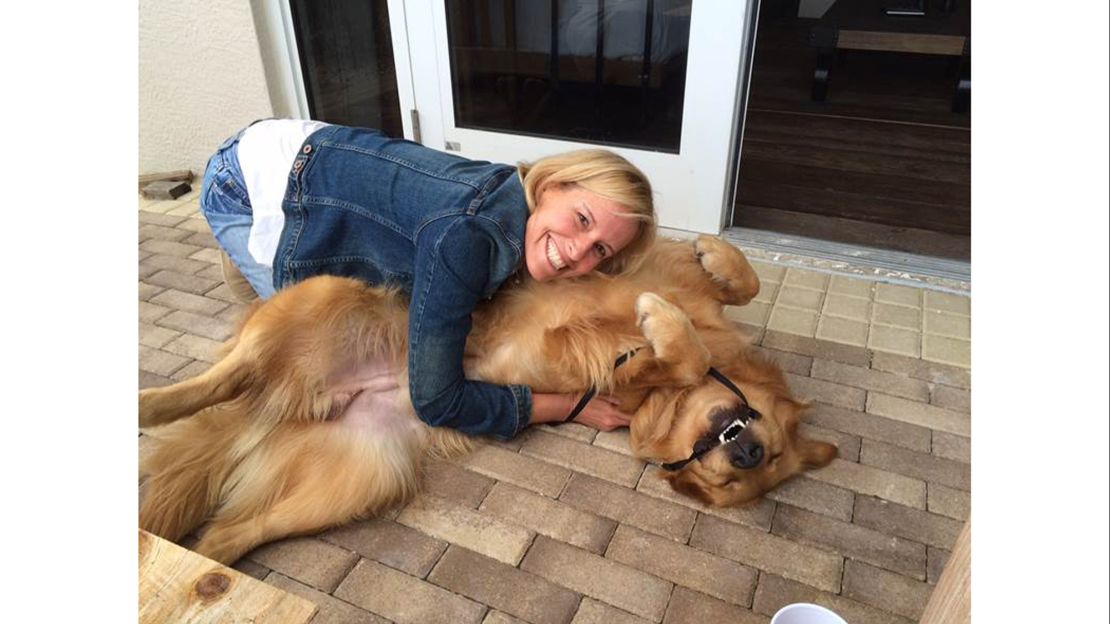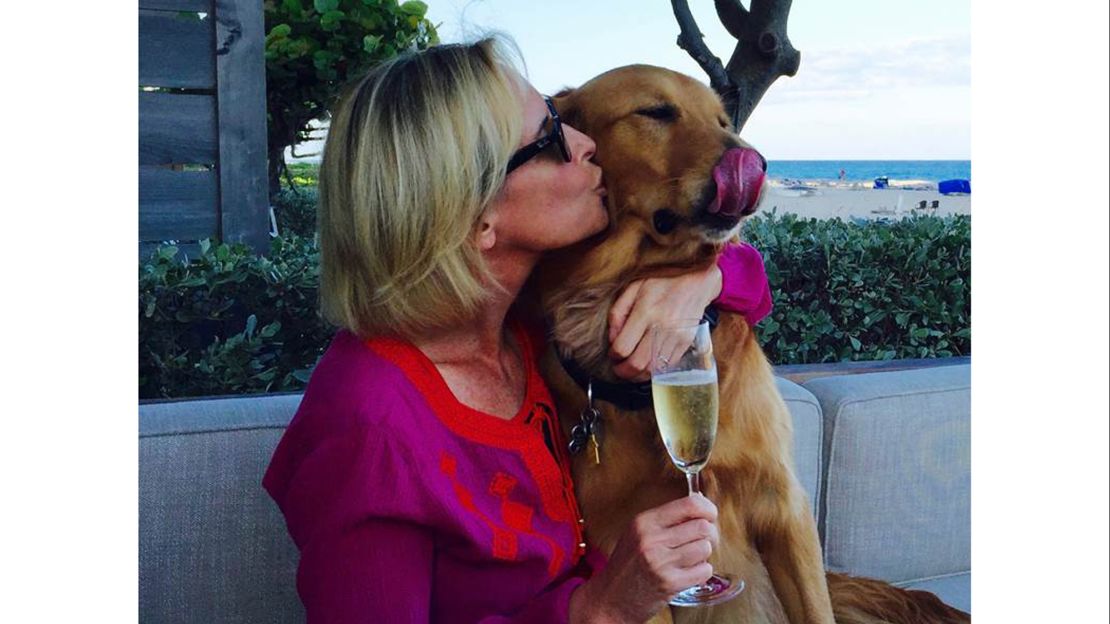Editor’s Note: Randi Kaye is a CNN anchor and correspondent. You can follow her on Twitter, Facebook and Instagram. The opinions expressed in this commentary are hers. Warning: This article contains graphic descriptions.
Story highlights
Randi Kaye: I've had the opportunity to own a dog rescued from a dog meat farm in Asia
Gatsby's story is an example of the fate facing many dogs and the need to end the dog meat trade, she writes
I was on assignment in Manchester, New Hampshire covering politics, but I had puppies on my mind. My husband and I were in the market for a golden retriever, and I had reached out to a handful of rescue organizations to adopt one. Then one day in February 2016, as I was working on a script, a text message came through.
I opened it to find a picture of a golden retriever puppy staring back at me. His face was so sweet and his eyes so big and brown and warm, it practically felt as if he was hugging me with them.

The message along with the picture read, “This dog is coming in this weekend. Do you want him?”
My heart skipped a beat. Of course I wanted him. I already knew I would never be able to say no to those puppy dog eyes.
That day in February was the beginning of an amazing journey and an eye-opening education.
The text message was from a woman named Linda Ripps who had started a Florida-based retriever rescue group called Golden Retrievals. For years, she’s been helping rescue dogs in Florida and across the country, but also dogs in South Korea. Why South Korea? Because as many as 3 million dogs a year are killed, according to Humane Society International (HSI), which says it obtained the statistic from a government source in South Korea.

Across Asia the numbers are far worse, with more than 30 million dogs killed annually as part of the meat trade, according to HSI. Until I had connected with this rescue group, I had no idea this was happening.
Turns out the dog I was already hoping to call my own had been rescued from a dog meat farm in South Korea and was on his way via Korean Air Cargo to a new life in the United States.
Linda Ripps told me, “My heart aches because I know the atrocities will continue and unfortunately so few Americans are aware of the cruelty and abuse.”
The dog meat trade
As I looked into the issue, I discovered the Humane Society here in the United States (HSUS) and HSI have been working to stop the sale of dog meat for years, and to shut down the meat farms permanently. In South Korea alone, HSI says that the government estimates there are about 17,000 dog meat farms. So far, HSI says it has has rescued more than 850 dogs and shut down 8 farms.

Wayne Pacelle, the President and CEO of the Humane Society in the United States, described the horrific conditions for the dogs, which he says humane society teams on the ground have seen firsthand. “The dogs stand on wire floors and are surrounded by metal bars, with their own feces accumulating beneath. The stench of ammonia on the farms is intense.” The wire metal cages are elevated from the ground so “they never feel the earth beneath their feet, or the comfort of a warm bed.”
Pacelle says the dogs are “vulnerable to the elements, which in South Korea means punishing heat in the summer and biting cold in the winter.” When he said that “it is a world devoid of affection or any acts of kindness for an animal whose greatest desire is human companionship,” it brought me to tears.
Adam Parascandola, the Director of Animal Protection and Crisis Response for Humane Society International, says the dogs are fed “food scraps” once a day, and the only water they get is what’s added to their food.
The dogs who fall victim to the meat trade are the same breeds of dogs you might have at home for a pet, including Golden Retrievers, Labradors, Saint Bernards, Huskies, even Chihuahuas.
For their meat, the dogs are either bludgeoned to death, electrocuted, hanged, or boiled alive, says Pacelle. “In some parts of Asia there is still a belief that the more the dog suffers, the more adrenalin will be in their blood and the better the meat will taste,” Pacelle says.
In a bizarre twist, nearly all the farmers who kill dogs for market also have dogs as pets, says Parascandola. “Unfortunately people have a really strong capacity to rationalize their behaviors and separate it out in their own mind, the pet dogs and the meat dogs.”
The Humane Society International is working to save the lives of “meat dogs” in China, Indonesia, India, South Korea, and Vietnam.
The governments in those countries are involved to some degree, with, for example, authorities in China even taking steps to limit the sale of dog meat at the controversial annual Yulin festival. Vendors this year will only be allowed to display up to two dog meat carcasses. Already hundreds of dogs have also been rescued by activists who were bound for slaughter at the festival, so there has been progress.
“Humans domesticated dogs more than 30,000 years ago, and they have changed the fate of humanity. Is this how we repay them, by putting them on a butcher’s block? The dog meat trade is an extraordinary abuse of the human-animal bond, “says Pacelle of HSUS.
Signs of hope
There is hope. More and more farmers want out of the business because of societal or family pressure, sympathy for the dogs, or because business isn’t so great anymore, according to both HSI and HSUS.
HSI is making deals with those farmers willing to try something new. It offers anywhere from $2,000 to $60,000 in grant money to the farmers to get them set up in a new field, like crop growing. The farmers must sign a contract in return vowing to leave the dog meat trade forever.
Adam Parascandola has personally visited the meat farms and rescued dogs. “We have a couple that went into blueberries. We had another farmer who planted chili peppers,” he says of the farmers who made the switch.

Attitudes are changing throughout Asia. The trade has been banned in Hong Kong, Taiwan, the Philippines, and Thailand.
Also, in South Korea, President Moon Jae-in would like to end the meat trade and is adopting a dog rescued from a meat farm. “Even five years ago we would never have had an open political discourse about the dog meat trade in South Korea so we are definitely seeing progress,” says Pacelle.
Of the 800-plus dogs that HSI has rescued, almost all of them have been adopted to loving homes in the United States, United Kingdom and Canada.
“This is perhaps the biggest dog exploitation in the world today … somebody has to stand up for them, and put a stop to this. If not us, then who?” Pacelle asks.
When they’re rescued, Adam Parascandola says some of the dogs are “extremely fearful. When you open the cage, most of them cower in the back.”
Gatsby
Which brings me back to the picture of that adorable golden retriever in my text message last year.
Two weeks after I first saw the photo, Golden Retrievals Rescue brought the dog to our home. As soon as he bounded out of the SUV and nearly knocked me over, I knew he wasn’t leaving. That first lick of my face and I was sold!

My husband and I were told he was about 18 months old and had probably spent most of his life in a cage in South Korea. He had no training and certainly didn’t respond to commands in English. We agreed to keep him for the night as a “trial period.” But a few hours into our home visit, a friend asked my husband, “How long before you know if the trial period is over?” My husband laughed and said, “Oh, it’s over.”
This beautiful purebred golden retriever had found his forever home.
We named him Gatsby.
I won’t tell you it was easy, because his adjustment at times was not. It took Gatsby many months to feel safe with us and trust that we weren’t going to hurt him or abuse him.
He had to learn how to walk on a leash and greet people politely. He still gets excited when he meets people because he wants them to pet him so badly, but he’s also learned to “shake” (with his paw), which is always a hit with kids.
He doesn’t beg or bite and now even walks with us off leash. He is so loyal, and seems to have an endless supply of love and licks to give. He never leaves our side, and is truly living up to the Golden Retriever’s reputation for being a “velcro dog.”
If I’m working on a laptop at home, he’ll come and rest his head right on the keyboard. If I’m in bed, he has to jump up and “spoon” with me. And if I’m doing yoga, forget it, he flops down on my yoga mat as if to say this dog is more important than any downward dog I may be doing.
The transformation has been truly incredible to see. A dog that was apparently raised in a cage to be somebody’s dinner is now living on the beach in Florida, where he takes regular runs and plays in the ocean. A true rags-to-riches tale.
I’m so thankful Gatsby came into our lives and that my eyes are now wide open to the dangers so many dogs face around the world. The commitment by the Humane Society, Linda Ripps at Golden Retrievals, and so many others working on behalf of these dogs is sure to make a difference.
Still, as Wayne Pacelle from HSUS says, “we recognize that you simply can’t rescue your way out of the problem.” That’s why the Humane Society is partnering with advocates and lawmakers on the ground “to help change policy and bring about meaningful and lasting change.”
Every day when I look at Gatsby’s sweet face, I am so grateful to be the beneficiary of an amazing dog that so many worked so hard to save.

If you’d like to learn more about dog meat farming, visit Wayne Pacelle’s (President and CEO of The Humane Society) blog “A Humane Nation.”




